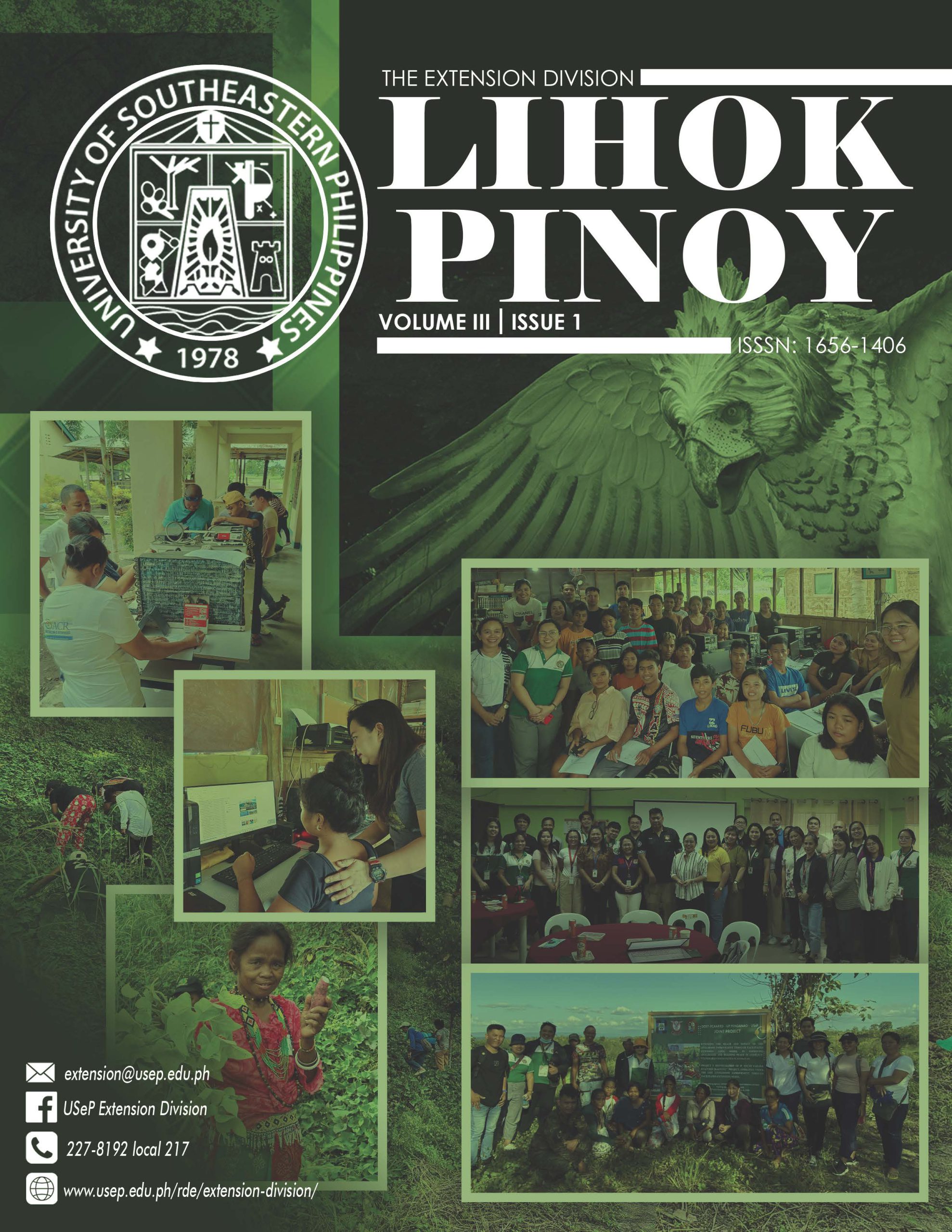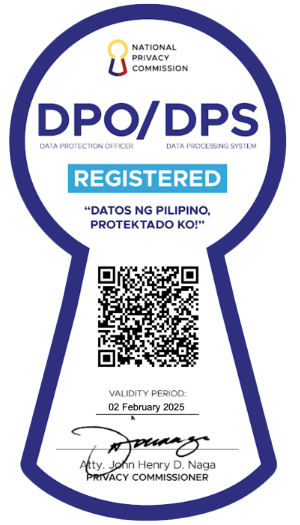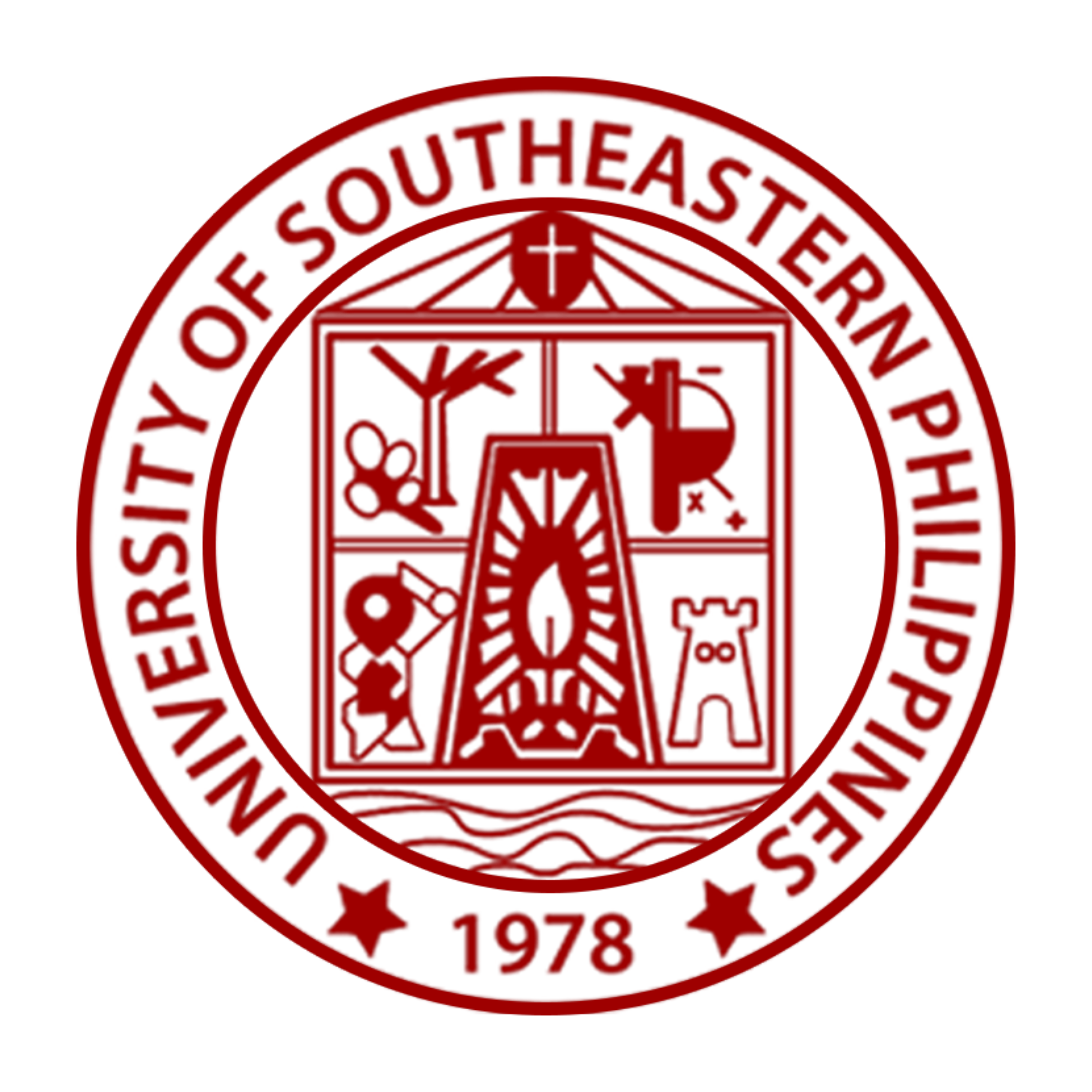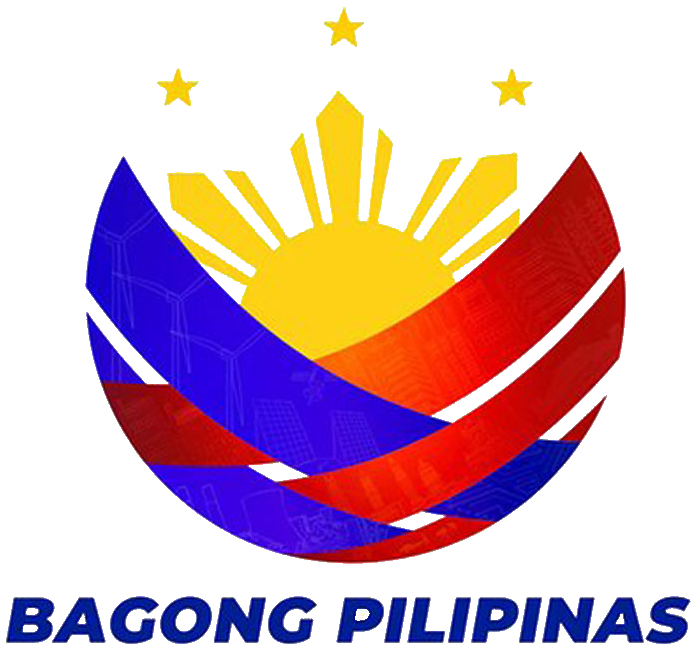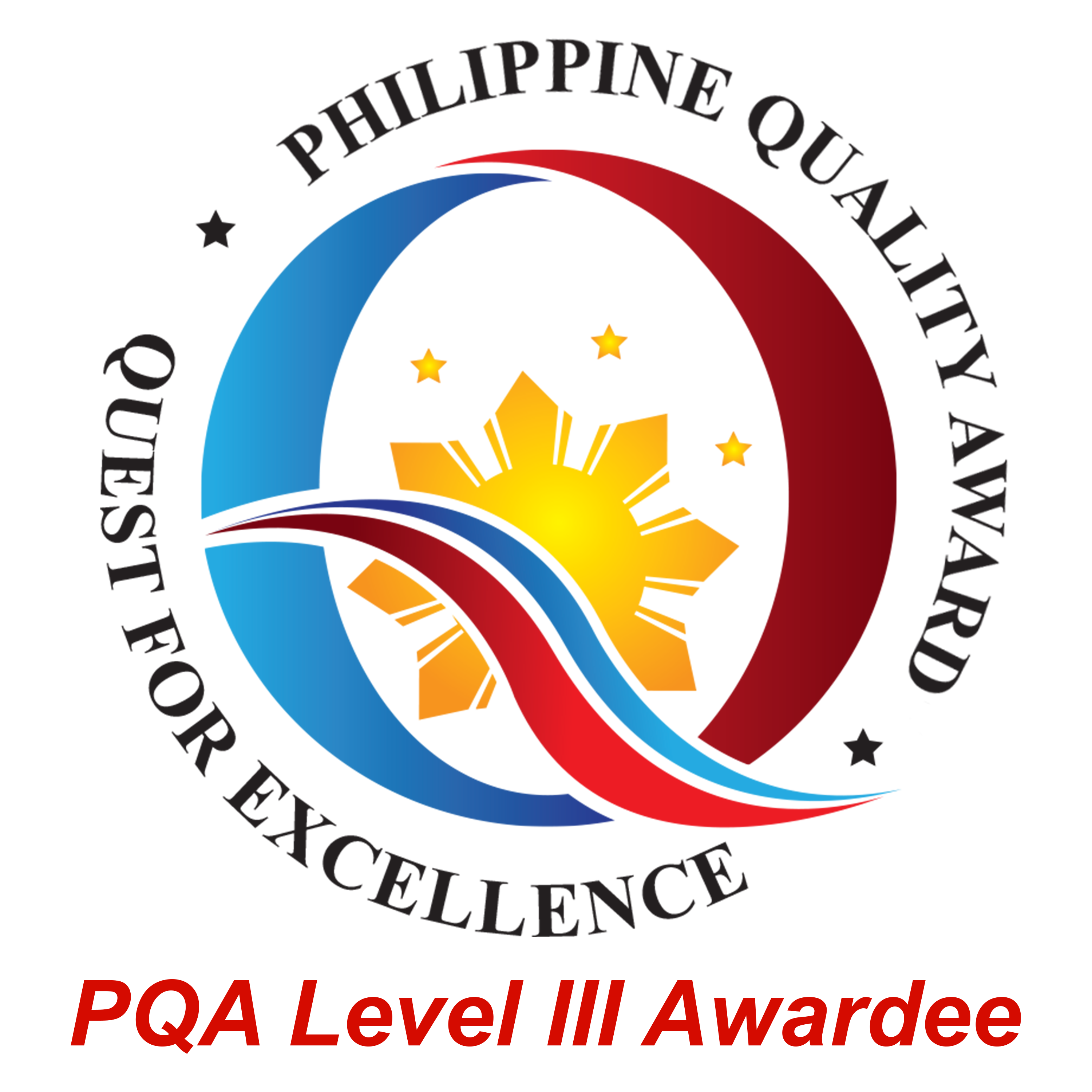Extension Division
The Extension Division on the other hand, focused on the continuing education and livelihood programs, in close coordination with the LGUs, people’s organizations and other stakeholders for manpower development and entrepreneurship. It aimed to contribute effectively in people empowerment of the region, equipping them with necessary knowledge, values, skills and competencies, and entrepreneurial abilities, to promote self-reliance, greater productivity and better communities.
- About
- Message from the Director
- Extension Unit
- Office Quality Objectives
- Extension Organizational Structure
- Extension Services Offered
- Programs/Projects
- Contact Info
- Publication
The University’s Extension Division is regarded as a well thought out academic attempt at cascading its developed and tested technology for the utility of the target clientele. The projects and activities shall dwell and thrive in a values-driven and educating learning environment. Extension is viewed as an equally important function along with instruction, research and production. Knowledge produced from research, conveyed through instruction, and employed as part of the University’s public services are all efforts directed towards the development of the individual and of the community at large.
The invigorating effect of research provides the boost and support towards the extension and instruction functions. This allows continuum and efficient delivery of services and to ensure that research outputs are disseminated, utilized and commercialized through extension services to benefit the target end-users and clientele. Thus, the University’s contribution to the pursuit of real-time and relevant knowledge is crucial.
It is through Extension services where the clientele’s research needs are passed on to researchers, presenting opportunities for the clientele to participate in research and make certain that the clientele understands and benefits from research-based knowledge and practices. Clientele participation and engaged learning, facilitated by extension work, guarantees that research processes and findings are grounded in and relevant to clientele needs while providing student assistants from various degree programs in colleges with valuable experience.
By the same token, Extension services conducted in conjunction with the degree programs of the colleges and within the college’s prescribed kilometer radius ensures practical and efficient delivery of extension work to the targeted clientele within its proximity

Extension is one of the core functions of the University. As its helping arm, the Extension Division, together with the different Colleges, continues to partner with various government and non-government agencies to deliver responsive extension programs.
Now, more than ever, we need to do what we can to help and recover as one nation. All efforts count. As Mother Teresa once said, "If you can't feed a hundred people, then feed just one." Armed with academic programs, relevant research, and competent personnel, we are privileged to be in the position to contribute to positive changes our partner communities.
Continuing Education Center (CEC)
The institution of a Continuing Education Center is a policy response to change and globalization. In the present knowledge based economy that characterizes the world, it is meant to sustain economic growth with more and better jobs and greater social cohesion in this part of the country.
Lifelong learning, which is the characteristic of the CEC, is considered not only central to competitiveness and employability; it is also central to social inclusion, active citizenship, and personal development.
The Continuing Education Center encompasses learning for personal, civic, and social purposes as well as for employment related purposes. It takes place in a variety of environments in and outside the formal education and training systems; it implies increasing investments in people and knowledge; promoting the acquisition of basic skills, including digital literacy; and broadening opportunities for innovative, more flexible forms of learning. It transforms formal education and training systems in order to break down barriers between different forms of learning.
The Extension Division shall:
- Facilitate the dissemination and utilization of research-based knowledge and technology to address issues and concerns of partner communities.
- Aid in the forging of partnerships between the university extensionists and partner communities.
- Organize capacity-building activities to equip university extensionists in delivering extension activities to communities.

USeP extension program takes on the following activities:
Grounded on the mandate of the university in the Typology of higher education institutions (HEIs), the University of Southeastern Philippines develop programs and outreach activities that allow students, faculty, and staff to apply the new knowledge and technology they generate to help address specific social development problems, broadly defined in CM0 46, s. 2012. It is guided from the definition of communication and transferring knowledge and technology to specific sectors and target clientele to enable them to effectively improve production, community and/or institutions, and quality of life, at the same time enhance HEI’s academic and research programs (CMO 8, s. 2010).
Under CMO 8, s. 2010, an Integrated Extension Program shall include the following components:
- Training programs – non-degree and noncredit courses offered by a college or unit;
- Technical assistance and advisory services – to agencies, organizations, associations, and other groups;
- Communication/information services - communication and/or dissemination of knowledge and skills to particular client groups through the various means of dissemination such as person-to-person contact, radio, television, newspaper and other printed materials.
- Community outreach activities – extension activities conducted in areas outside the university/college, e.g., community-based social services, pilot projects, mobile clinic, etc.
- Technology transfer and utilization – the process of circulation, promoting and marketing research outputs or technologies to potential users.
The mission of the CEC shall be to foster professional and personal development by sharing the knowledge and expertise of the University, and by making its resources available to individuals of all ages. It will offer non-credit, non-degree educational programs, and services grounded in the rich intellectual and professional resources of USeP faculty and staff and facilitate non-formal education opportunities in the colleges. It aims to provide people of all ages equal and open access to high-quality learning opportunities and to a variety of learning experiences that are built around the needs and interests of learners.
Agham at Matematika susi sa Tagumpay (AGiMAT)
The Agham at Matematika susi sa Tagumpay at kaunlaran (AGiMAT) is a project proposed by the College of Teacher Education and Technology (CTET) to train selected secondary Mathematics and Science teachers in the Municipality of Talaingod and Kapalong
AGiMAT aims to (1) mobilize and organize participants and other concerned stakeholders in preparation for the project implementation; (2) train secondary schools teachers in identified partner schools in the Municipality of Talaingod and Kapalong specifically on: (i) pedagogy (developing critical and thinking skills among DOST scholarship applicants and developing test taking skills among DOST scholarship applicants); (ii) test (construction/development developing DOST Exam – like test items); and (iii) program implementation (implementing review program for DOST scholarship applicants);(3) monitor and evaluate project implementation and progress; and (4) disseminate relevant information to concerned stakeholders.




OPERATION: Tulong Alay sa Pag-angat ng Buhay At Kaalaman ng Nangangailangang kabataan at Ginabayang mga Guro (TABANG)
Operation TABANG (Tulong Alay sa Pag-angat ng Buhay At Kaalaman ng Nangangailangang kabataan at Ginabayang mga Guro) is a special project of the College of Teacher Education and Technology from May 2018 to December 2021 to answer the request of Hope for Children Development Center (HCDC) of Tagum Alliance Gospel (TAGC) as partners in helping their case workers/mentors, the children and even parents.
Operation TABANG is a research-based project with a series of activities and different phases that endeavors to address the needs of the community; thus directly contributing to the realization of one of the missions of the University which is to conduct relevant extension through different stakeholder collaboration.
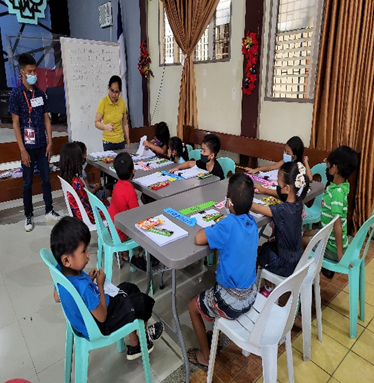
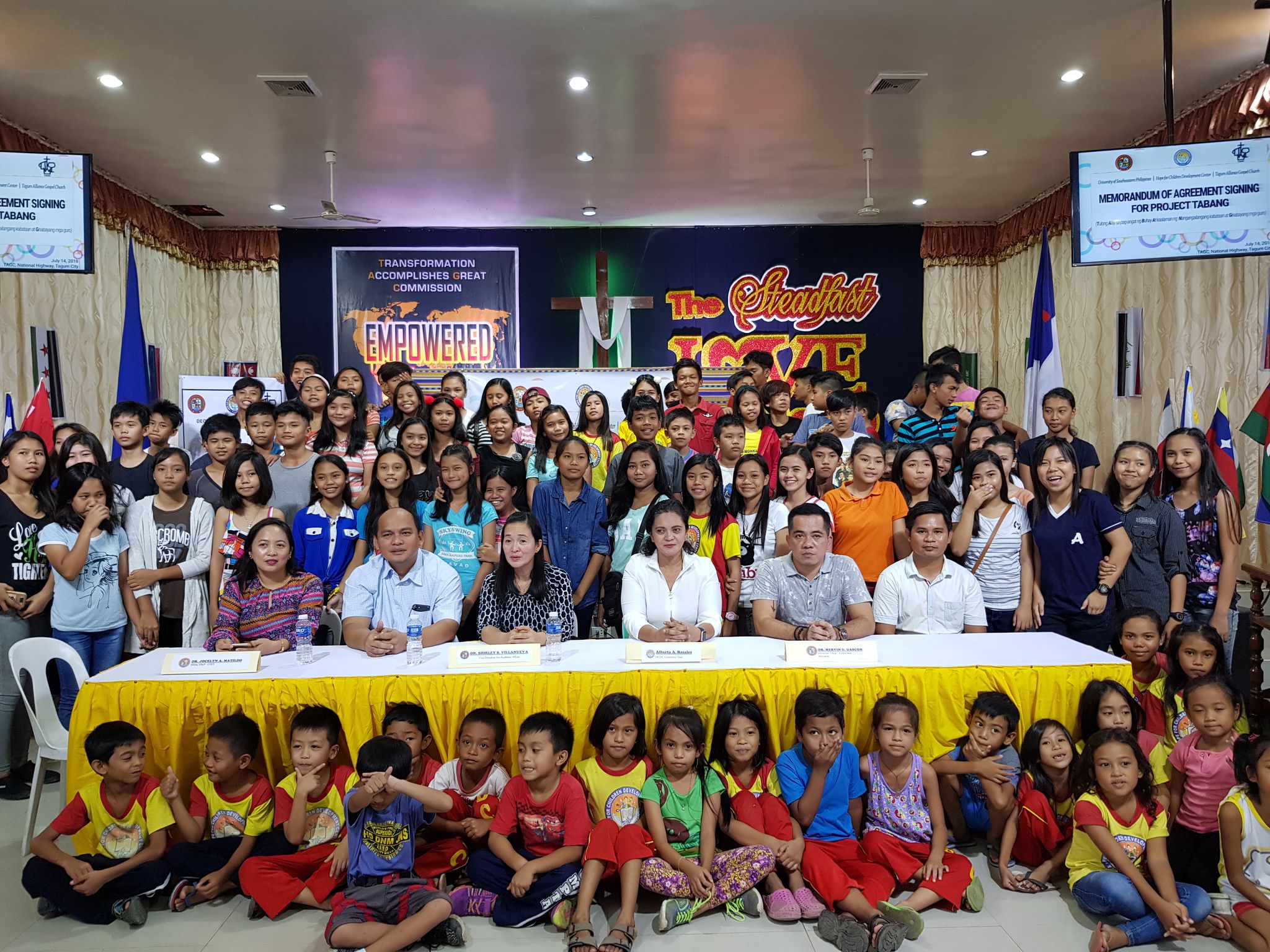
ILAYAG UG IWAHIG: Household Electrification Sustainability and Water System Installation in Sitio Igang, Talaingod, Davao del Norte
The program ILAYAG UG IWAHIG is an ongoing University program that aims to provide household electrification sustainability and access to safe water in Sitio Igang, Talaingod, Davao del Norte. It is comprised of two projects namely: Project EnggKindle and Project WaterEngg. Both projects are implemented by the faculty members of the USeP College of Engineering whose expertise in the engineering field ( electrical, electronics, civil, mechanical, and sanitary) is relevant and fitting to carry out the task.
The Project EnggKindle aims to sustain the household electrification (HE) PISOLAR project earlier implemented by the University to Sitio Igang with 19 beneficiaries. PISOLAR is a DOST-funded R&D project with a pay-as-you-go payment system for payment of solar home systems (SHS). It has deployed eight (8) SHS in the area, providing 19 households with lighting, and cellphone charging ports. Though there were activities on general orientation and specialized training provided by the PISOLAR team to the beneficiaries, both were not enough since the PISOLAR project just ended in June 2021 and the team saw the need for additional training; operations and maintenance (O&M); and monitoring and evaluation (M&E) to achieve sustainability. Thus, this project.
Meantime, Project WaterEngg aims to provide access to safe water to the community. The project comprises of the water system (WS) design, specification, installation, sustainable management training, and M&E. At the time of the project implementation, the community’s access to a safe water source is either through fetching at the lower areas of the mountain where the spring source is located or travel to nearby sitios. Unfortunately, the terrain where the community is sloped and the location of the communities with water reserves is far, implicating a costly endeavor if the partner community opts for the latter. Thus, this project alleviates their difficulty in finding water sources and address the sanitation and hygiene of the partner communities.
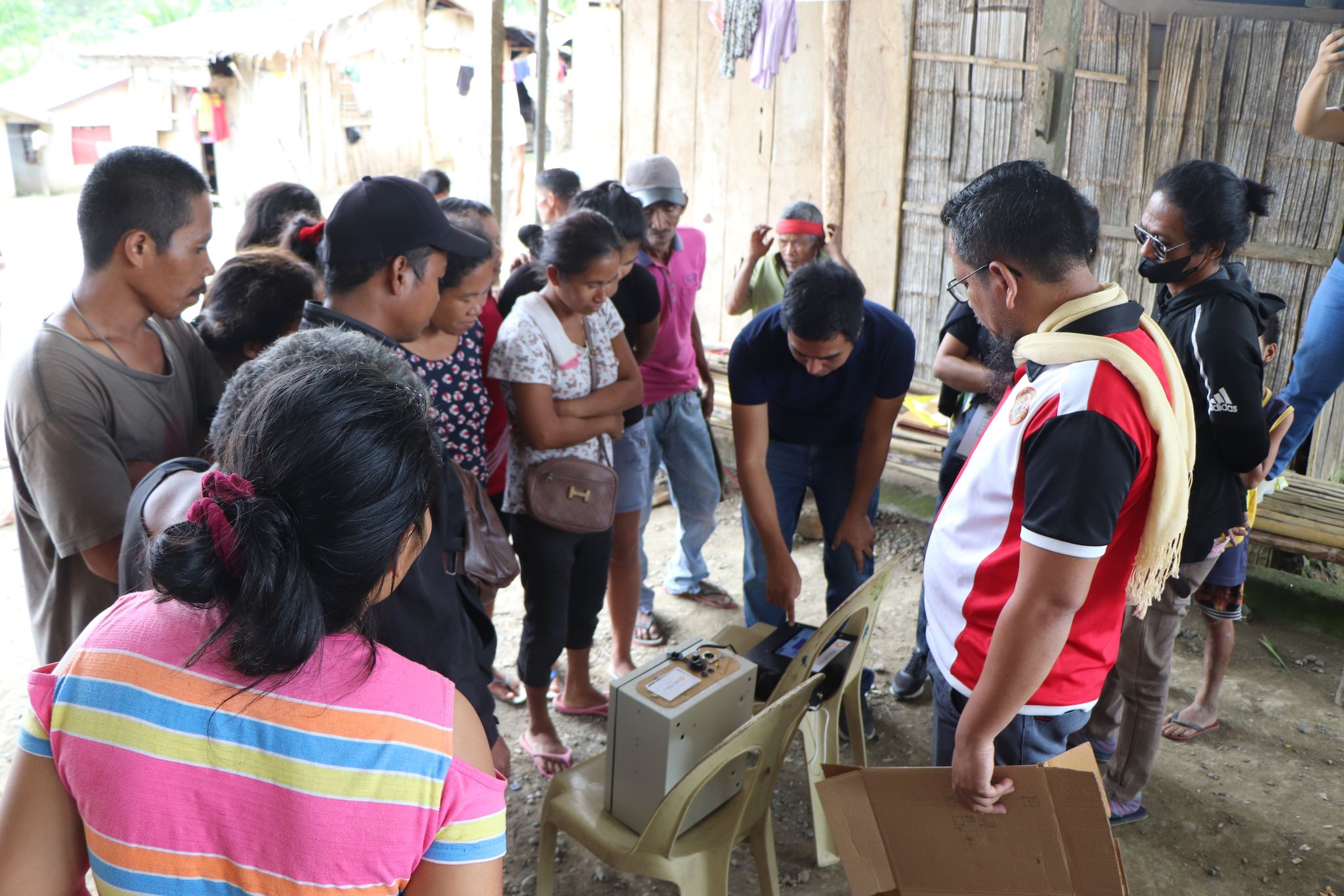
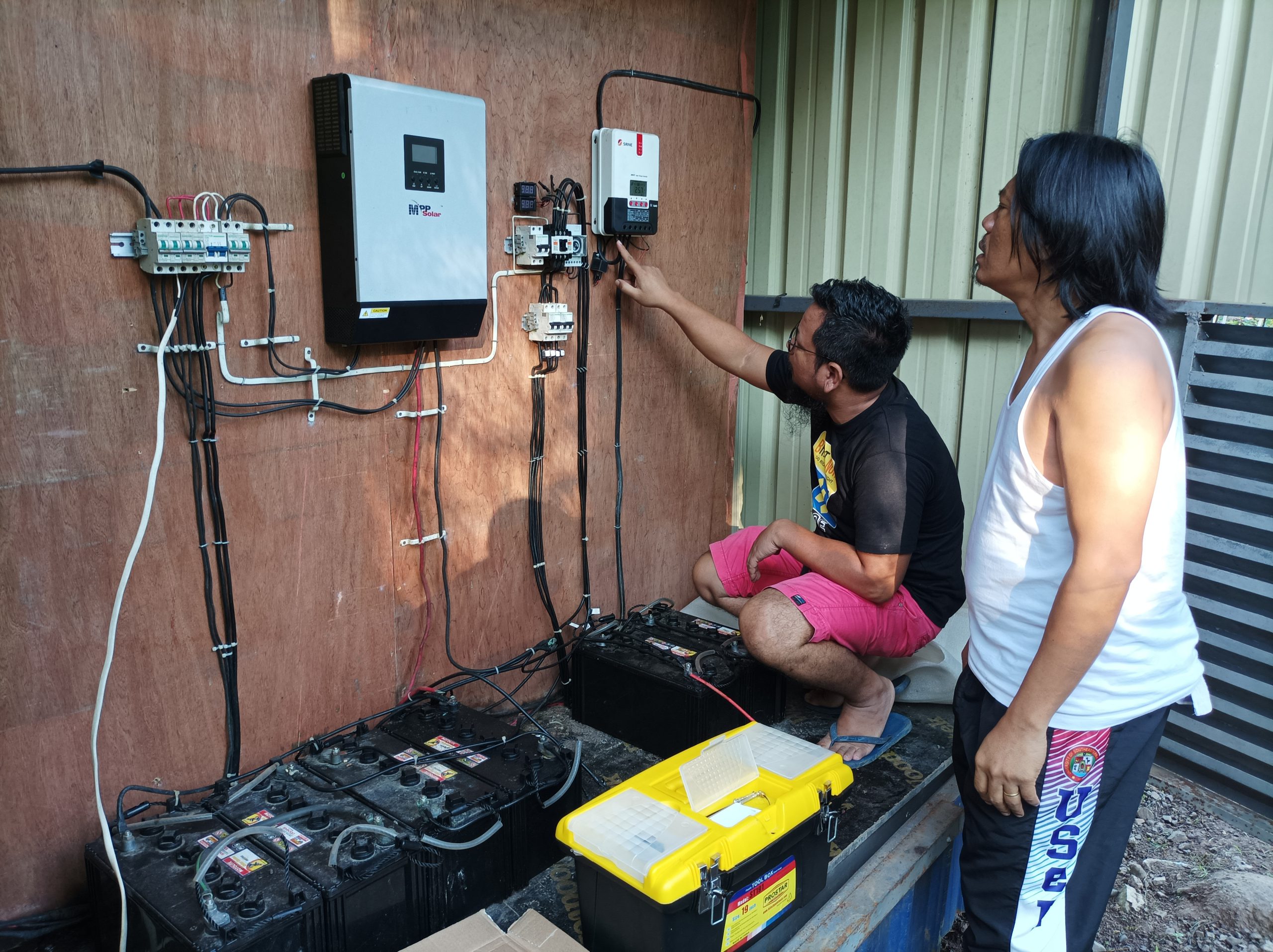
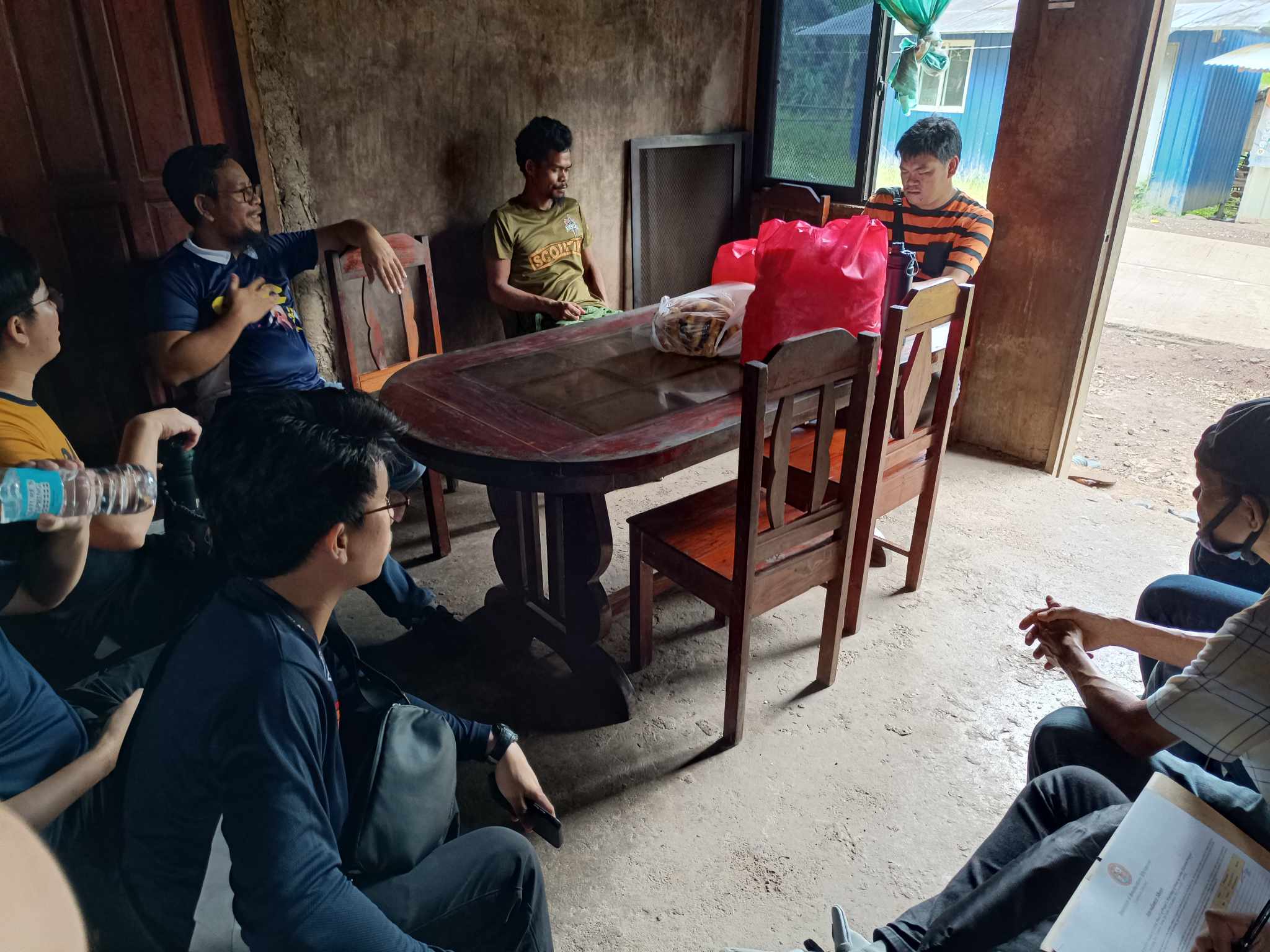
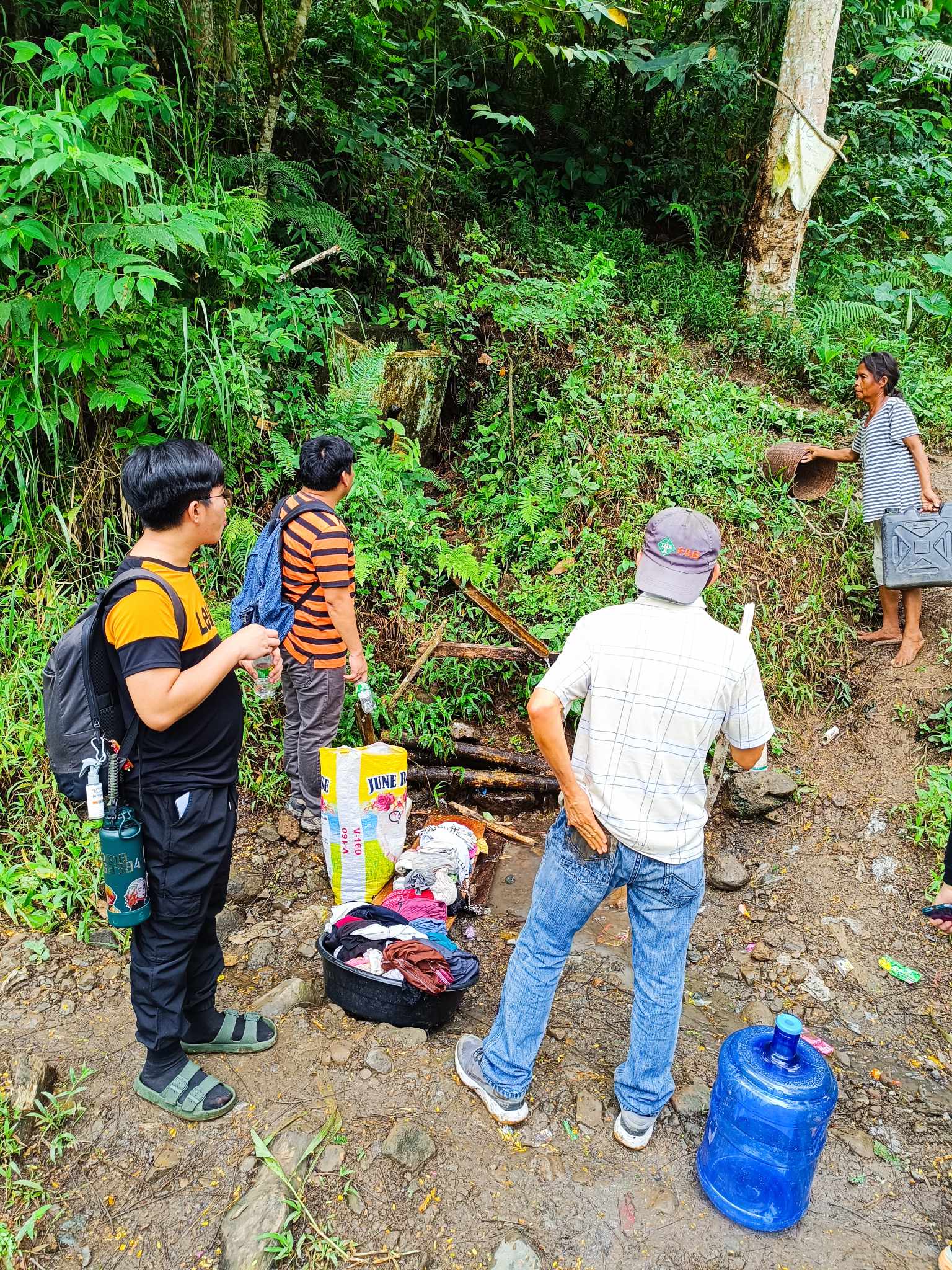
Out-of-School Youth Information System (OSYIS)
The College of Information and Computing (CIC) is fortunate enough to be granted an international partnership and funding from the Education Development Center (EDC) through the USAID Opportunity 2.0 program. This partnership involves the following projects namely:
Project 1: Installation, Configuration, and Deployment of the Learning Management System (LMS)
Project 2: Design, Development, and Implementation of the Out-of-School Youth Information System (OSYIS)
The target group of this program are All Out of School Youth and Alternative Learning Systems (ALS) Teachers including other stakeholders of the government and private agencies in the locality. The duration of the project ran from November 1, 2021 until October 31, 2022.
The Alternative Learning System (ALS) is one of the interventions of the government operated by the Department of Education (DepEd) for out-of-school youths (OSYs) and adults. However, only a small proportion of the target population is enrolled in the ALS program (Worldbank, 2016). It was reported that it is challenging to capture out-of-school youth once they leave the formal school system under the current education system. Moreover, the large class size and monitoring of the activities are some of the challenges of the ALS program. The proponents conducted a needs assessment, including data collection and analysis, a summary of the findings, migration strategy, and recommendations.
The proposed web-based out-of-school youth information system (OSYIS) with Learning Management System (LMS) is an information system that enables OSY to register and avail of the services of the government and private sectors. The OSYIS was the central repository of the OSYs in Davao City. Also, the OSYIS aims to capture OSY. The reports produced by the OSYIS were used to generate insights for decision-making, such as budget allocation and early intervention programs.
Moreover, the LMS supported the delivery of educational activities to the beneficiaries. The LMS serves as a repository to store learning materials that allow service providers to logically organize, use, and repurpose various resources, including book collections. The LMS was dynamically designed to accommodate more features for synchronous and asynchronous learning.


Amoma ug Giya Alang sa Kahamugaway (AGAK)
Amoma ug Giya Alang sa Kahamugaway (AGAK) - Care and Guide for Stability is a mitigation and adaptation strategy that aims to achieve resiliency among the most vulnerable group in society to ensure that they are cared for and guided to achieve stability and sustainability in their day-to-day activities specifically during and after calamities.
It is an intervention that addresses the present need for food due to COVID-19 and supports the HEAL as ONE Act. Due to uncertainties brought about by the pandemic, this intervention helps ensure that vulnerable groups are taken care of by marketing and distributing farm produce to those who are in need.
This project is in partnership with government organizations and the private sectors by pooling financial and technical resources, to address the market disruption and flow of goods in the economy and specifically address the needs of lP Communities in Region Xl.


KaBULIG (Kalambuan sa BACASIFIA on Upscaling Livelihood Integrated Growth)
The National Irrigation Administration (NIA) Main Office granted a PhP1M worth of project to NIA-Region XI for a pilot drip irrigation project. Since the drip irrigation project needs specific technology and the local farmers are only practicing communal irrigation systems, NIA-XI requested technical support on the matter. Thus, the University of Southeastern Philippines-College of Agriculture and Related Sciences (USeP-CARS) has been tapped to provide the needed technical support.
Based on the conducted needs assessment analysis, it turned out that the beneficiary - BACASIFIA (Batinao, Cabacungan, Sto. Niño Irrigators Farmers Association) at Brgy. Batinao, New Bataan, Davao de Oro hoped and requested appropriate technical training. Training will be conducted for the farmers' cooperator such that the BACASIFIA women’s farmers will be better equipped with knowledge and skills so that the project can be managed and sustained, and become a source of stable income.
For the project to proceed as planned, the USeP-CARS will pool its faculty experts to collaborate with the project as part of the College’s core extension activity. In this way, the College will establish strong linkages with the leading government agencies and People’s Organization (PO).
The program and the linkages created are envisioned as a venue for USeP-CARS to showcase technologies generated from faculty research and students’ theses. Eventually, a sustainable demonstration farm on agro-tourism will be showcased, and outputs and results of the implementation of the program will be made accessible to any interested parties or individuals.


Maragusan Growers Multi-Purpose Cooperative (MAGROW MPC)
The Maragusan Growers Multi-Purpose Cooperative (MAGROW MPC) requested the College of Agriculture and Related Sciences (CARS) for technical expertise regarding the operation of tissue culture laboratory for the establishment of their Banana Tissue Culture Laboratory towards addressing the demand for quality seedlings of its farmer-members. The cooperative will cover the expenses for the training and other needs for this project. This was conducted with a duration of twelve (12) months that ended last April 30, 2023.
The main objective of this project is to assist and guide the MAGROW MPC in creating and building their tissue culture laboratory. Specifically, it aims to:
- Assist the MAGROW MPC in creating the design and construction of their laboratory building.
- Train the MAGROW MPC personnel on the system of tissue culture laboratory, the selection process of explants, the inoculation/isolation process, and media preparation.
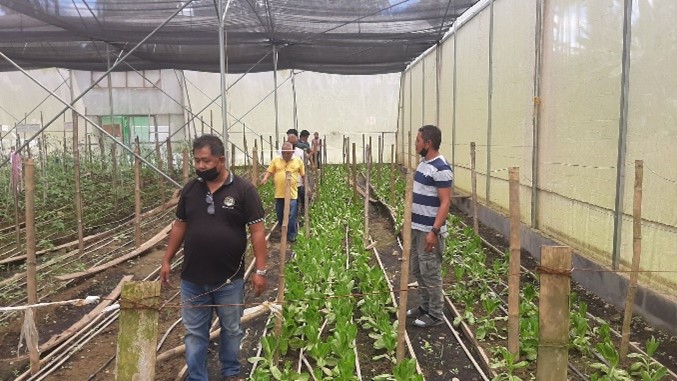

Science for the Convergence of Agriculture and Tourism: A project on the Advancement and Generation of Reliable Source of Income through Value-added Innovations and continual Dissemination of Agri-Technologies towards Sustainable Farm Tourism (SciCAT AGRI-VIDA)
This project is a continuation of the visionary purpose of the DOST PCAARRD-funded farm tourism program entitled “Science for the Convergence of Agriculture and Tourism” or the SciCAT program. This project is entitled “SciCAT AGRI-VIDA: A project on the Advancement and Generation of Reliable Source of Income through Value-added Innovations and continual Dissemination of Agri-Technologies towards Sustainable Farm Tourism”. From the name itself (AGRI-VIDA), this Phase II project seeks to hone a farm tourist site into a leading character in a community. The site serves as a prominent figure that embodies value-added innovations in agriculture and a strong entrepreneurial spirit towards sustainability in business and its environment.
Farm tourism continues to flourish in the Philippines amidst the pandemic. With the successful implementation of Phase I, this project provides science-based packages of technologies (POTs) in the community with an emphasis on value-added innovations. Some of Phase I project implementation breakthroughs include the establishment of five (5) POTs for rice, native chicken, goat, duck, and tilapia commodities, generating an additional employment opportunity for the community Phase I focused on intensifying production and promotion of the abovementioned enterprises. These interventions provide an opportune time to provide necessary support to the farm owners in the aspects of postharvest handling and processing.
As aforementioned, the name of the project develops the farm site into a model farm in farm tourism which showcases POTs for farm value-added products which were developed through research and development (R&D) to help create employment and entrepreneurship at the community level. It is hoped that the Magsasaka-Siyentista (MS) farm generates a strong and sustainable source of income so that more farming enthusiasts will replicate this modality and adopt the POTs being introduced.
This project also believed that collaboration has always been an effective means of synergy. Hence, the SciCAT AGRI-VIDA project strives to facilitate collaboration and linkages for the MS farm to various farm tourism sites, food processors, entrepreneurs, and agencies from public and private entities. Agreements and partnerships are also hoped to be forged between these parties to ensure inclusive and holistic growth.
This phase 2 SciCAT project dubbed as SciCAT AGRI-VIDA continues to provide capability enhancement training and agricultural technologies not only to Dimpas Farms but to other farming enthusiasts with emphasis on value-added innovations. Packages of technologies (POTs) on value-addition were downloaded and disseminated to the intended beneficiaries which are hoped to advance and generate reliable sources of income for farm tourism sites, food processors, farmers, entrepreneurs, and other interested individuals.
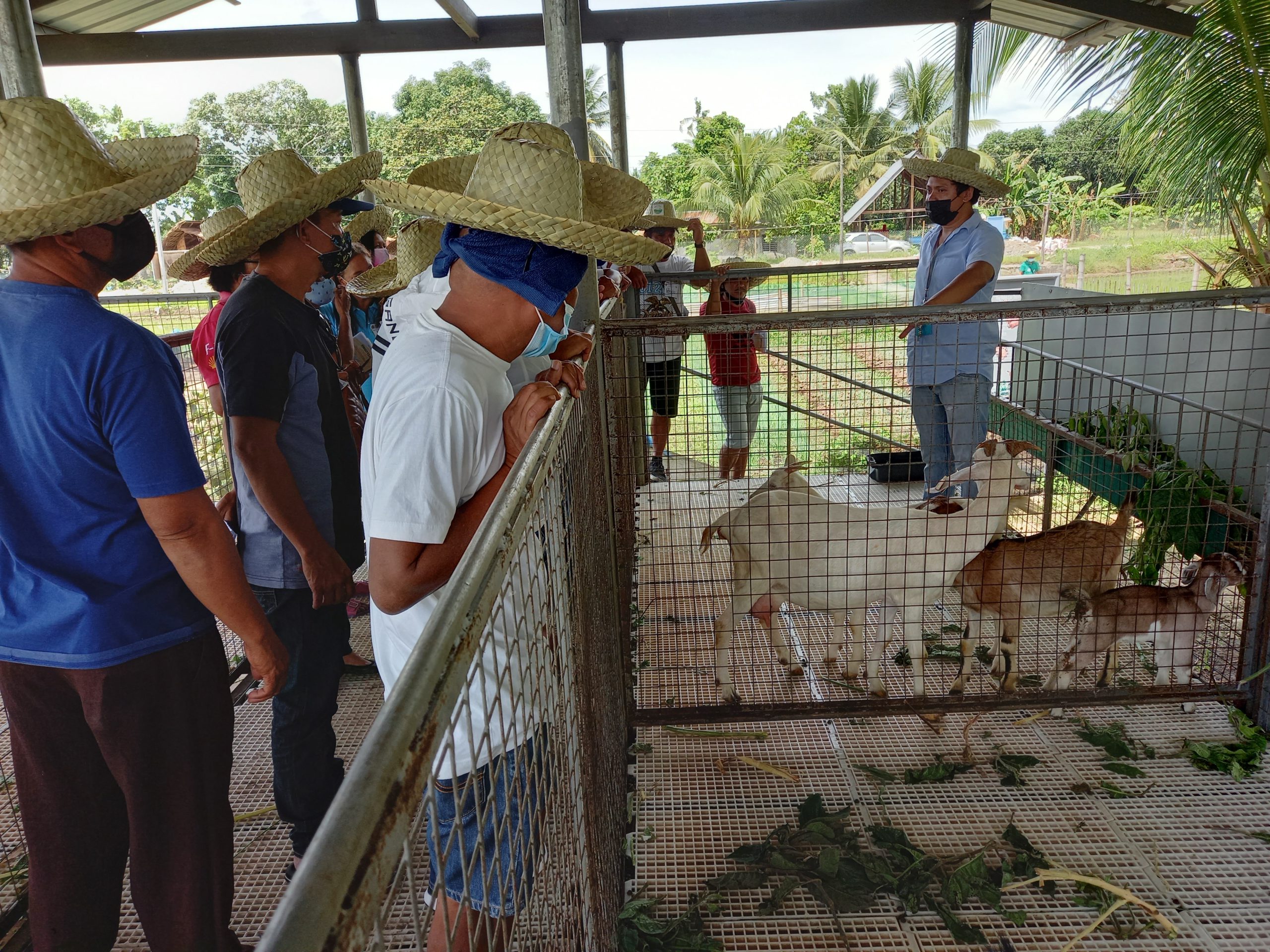
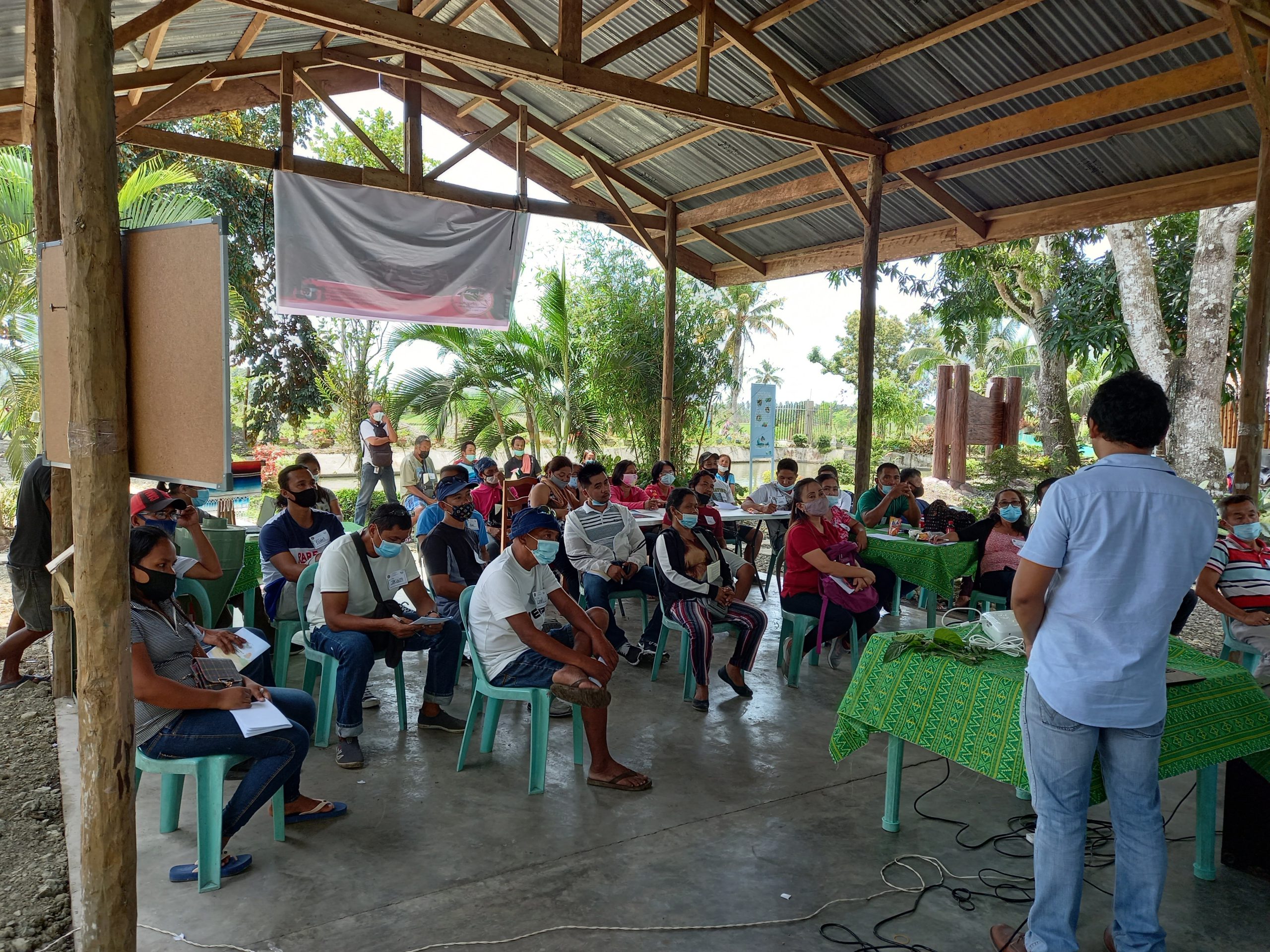
Bakawan Para sa Kinabukasan: Mangrovetum Establishment, Capacity Building, and Development of IEC Materials in Sanipaan Marine Reserve, Bgy. Tambo, Babak, IGaCoS
Mangroves provide a range of ecosystem services. These largely include the provision of timber, fuel wood, medicines, natural dyes, honey, and marine food. They also help in regulating floods, erosion, and saltwater intrusion; and protect coastal communities against the harsh impacts of storms and tsunamis. The dense root systems of mangrove forests trap sediments flowing down rivers and off the land. This helps stabilize the coastline and prevents erosion from waves and storms. They also serve as breeding and nursing grounds for marine finfish and shellfish species. It is also a biodiversity habitat and fishery resource and provides socioeconomic, cultural, and environmental benefits to coastal communities (Braat et al., 2012; Primavera, 2000).
Sanipaan Island and Bgy. Tambo Aplaya has been the sampling site of several research endeavors by both faculty and students of Nat. Sci. Department of CAS and so on December 11, 2019, faculty members of the Natural Sciences Department of CAS, USeP conducted a needs assessment by having a Focus Group Discussion with key officials of Bgy. Tambo Aplaya. History of the said barangay was narrated by some of the participants and economic activities as well. The influx of tourists in the area and the need to name marine species in the local dialect was identified; to sustain the community’s livelihood of fishing of economically important species in the area, the need to re-forest the mangrove area by tree-planting was also deemed as essential.
With the abovementioned needs of the community, this program proposed to establish a mangrove nursery in Sanipaan Marine Reserve. Further, the proponents will capacitate the stakeholders with the knowledge and skills to be able to engage in the project. Also, species inventory in Mangrovetum of Brgy. Tambo and development of IEC materials will be performed.


Alalay sa Barangay 2.0
Alalay sa Barangay Program 2.0 (ABP 2.0): Empowering Womenpreneurs is the College Extension Program of the College of Business Administration with Barangay Centro (San Juan) Agdao as its partner community.
This undertaking is in support of the Gender and Development (GAD) agenda of the University which recognizes the equal contribution of women and men in development. This promotes women's empowerment that contributes to economic development. Moreover, the program supports Republic Act No. 9710 or An Act Providing for the Magna Carta on Women (2009) and Davao City Ordinance No. 5004, otherwise known as the Women Development Code of Davao.
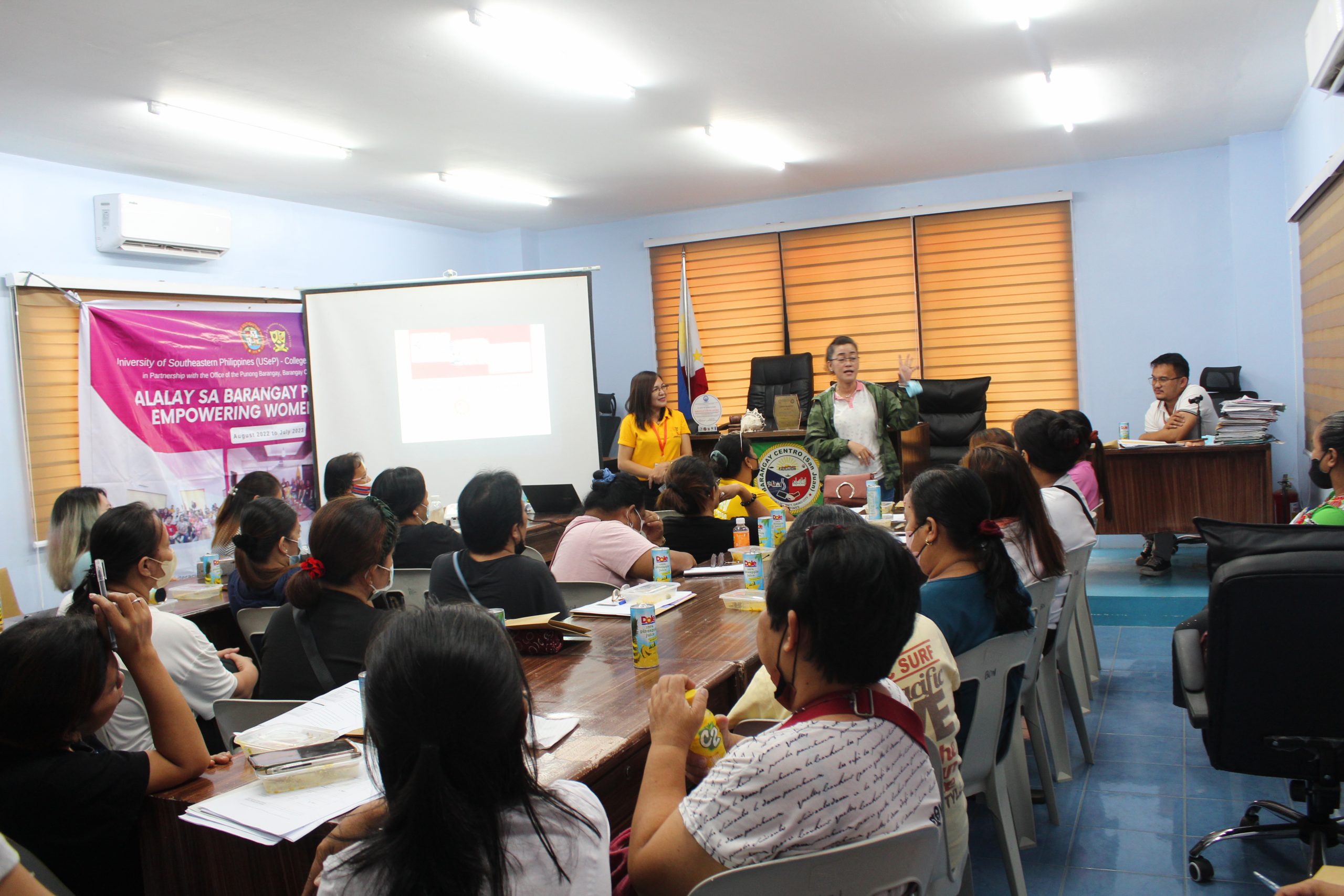
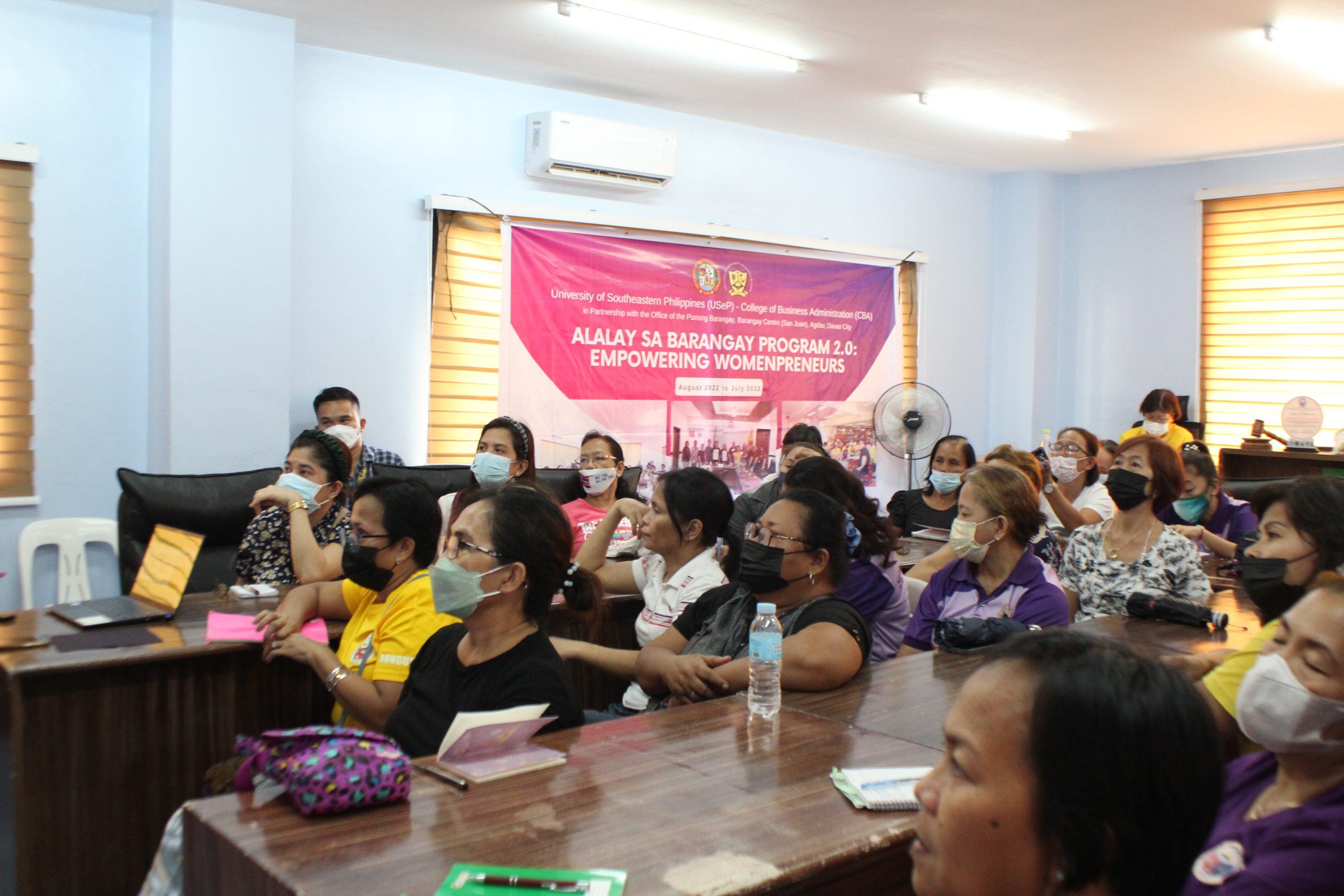
Agri-Fisheries Cooperatives on Technopreneurship for Adaptation and Mitigation Initiative in Agriculture (ACT for AMIA)
The Localized Climate Information Services (CIS) component of Climate Resilient Agriculture 2.0: ACT FOR AMIA Project is an initiative in agriculture that provides a full range of advice on climate, particularly on its impact on crops, livestock, fisheries and management practices as well as on how to prevent, reduce or manage accompanying risks; knowledge capacitation will be given to farmers to help them make management decisions that will reduce the risks and benefit from the opportunities of our variable and ever-changing climate.
The said project collaborated with the Philippine Atmospheric Geophysical Astronomical Services Administration - Mindanao PAGASA Regional services Division (PAG-ASA - MPRSD) which has the resources and capabilities to extend services related to climate science and local weather information that are very useful in creating climate-resilient agriculture among communities, through a climate-informed agricultural production for the development of the partner communities.
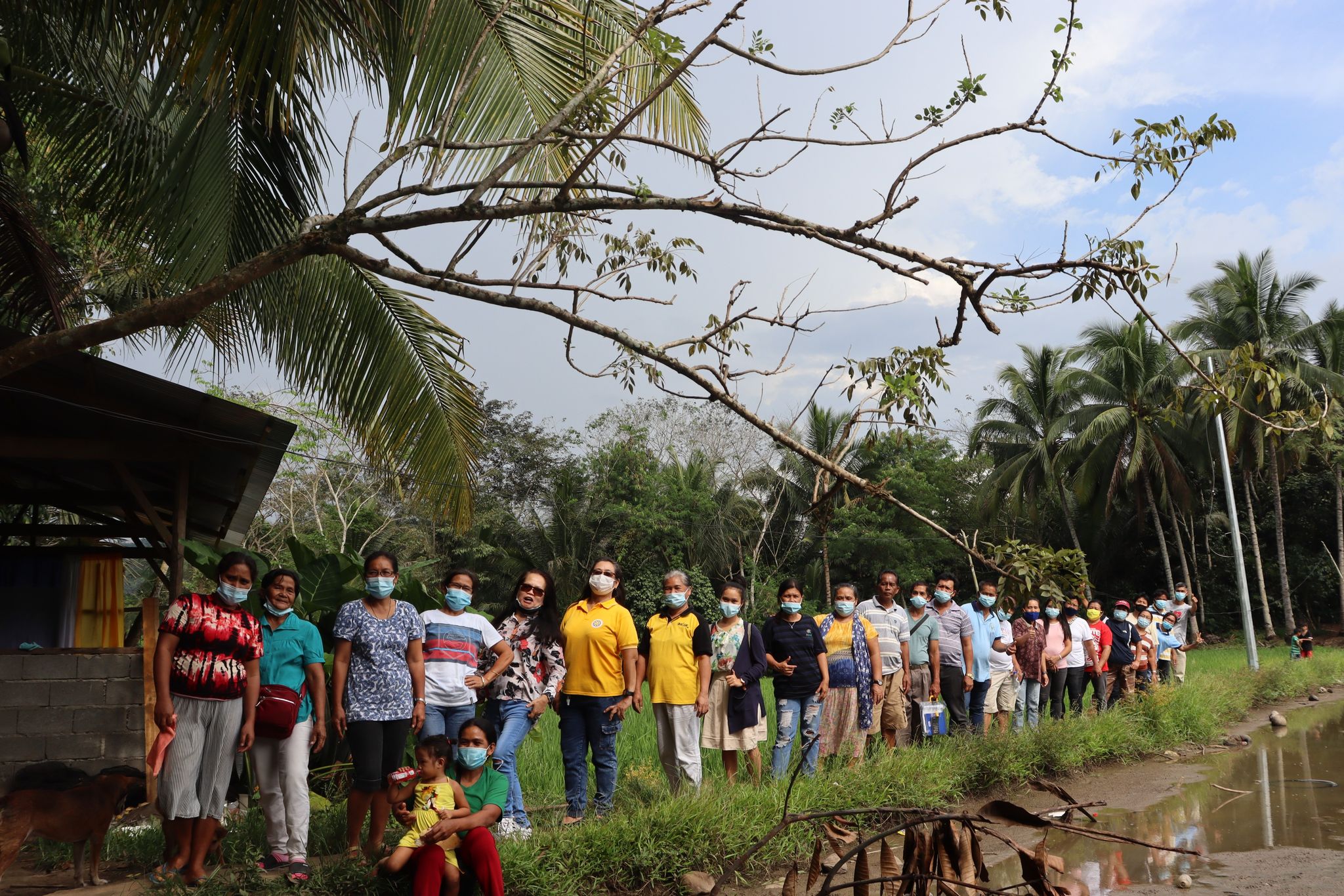
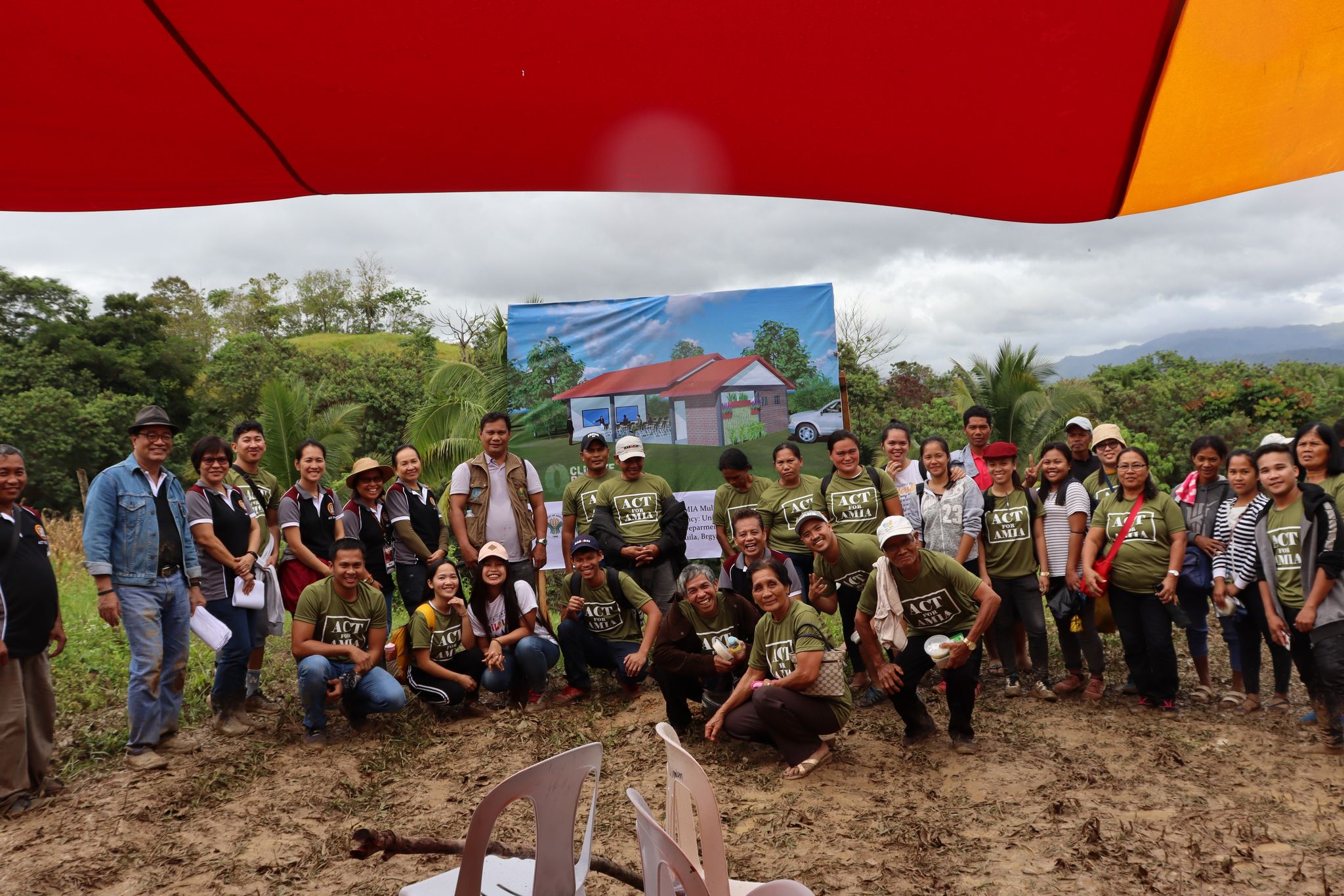
Sustainable Services for Social Transformation And Indigenous peoples’ Empowerment and Development (SUSSTAINED)
SUSSTAINED is a program initiated by the University of Southeastern Philippines – College of Development Management (USeP-CDM) which envisions helping the selected indigenous households of Malagos District, Davao City to establish a sustainable way of living; improve finances; attain good education; address health problems; have access to potable and clean water source.
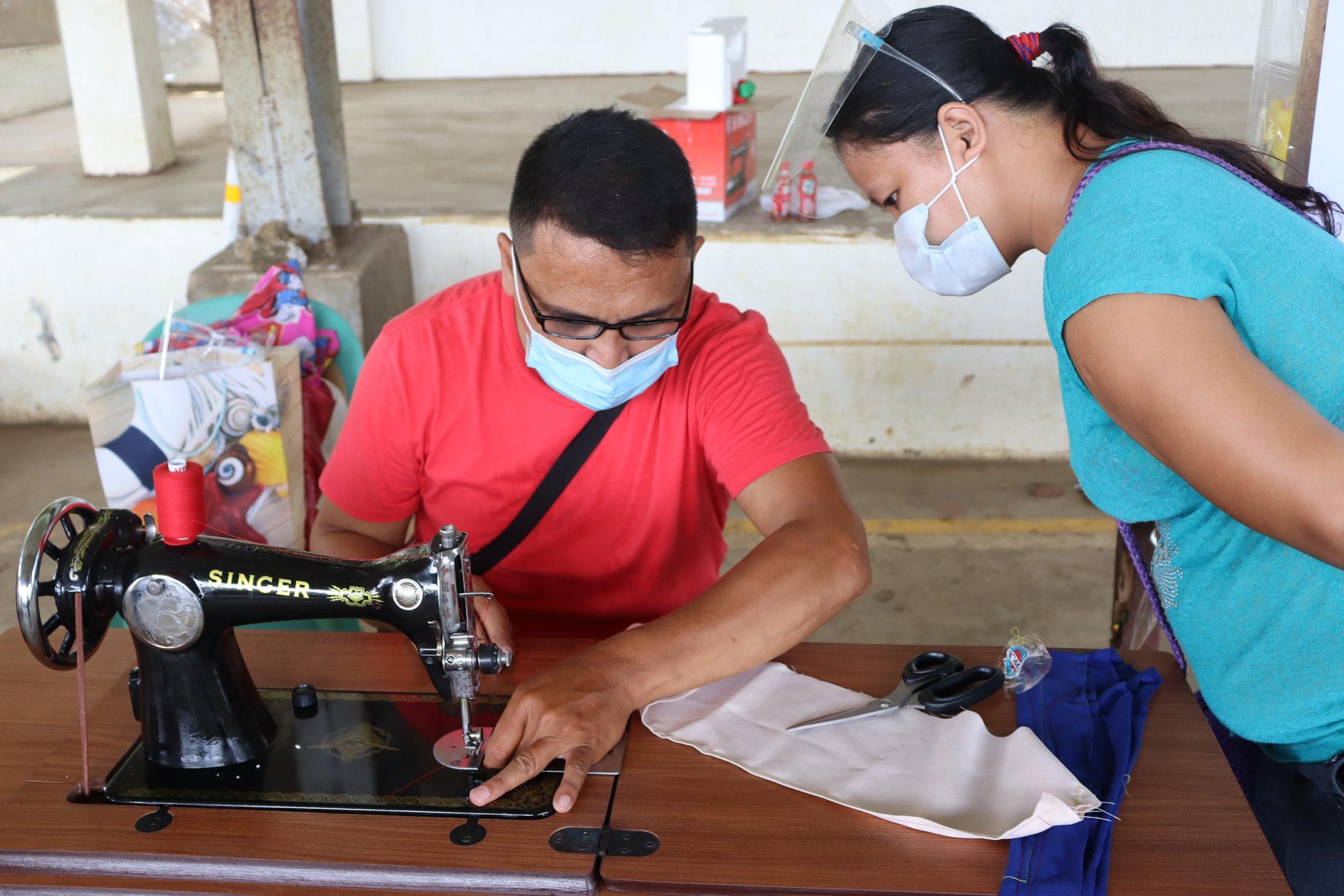
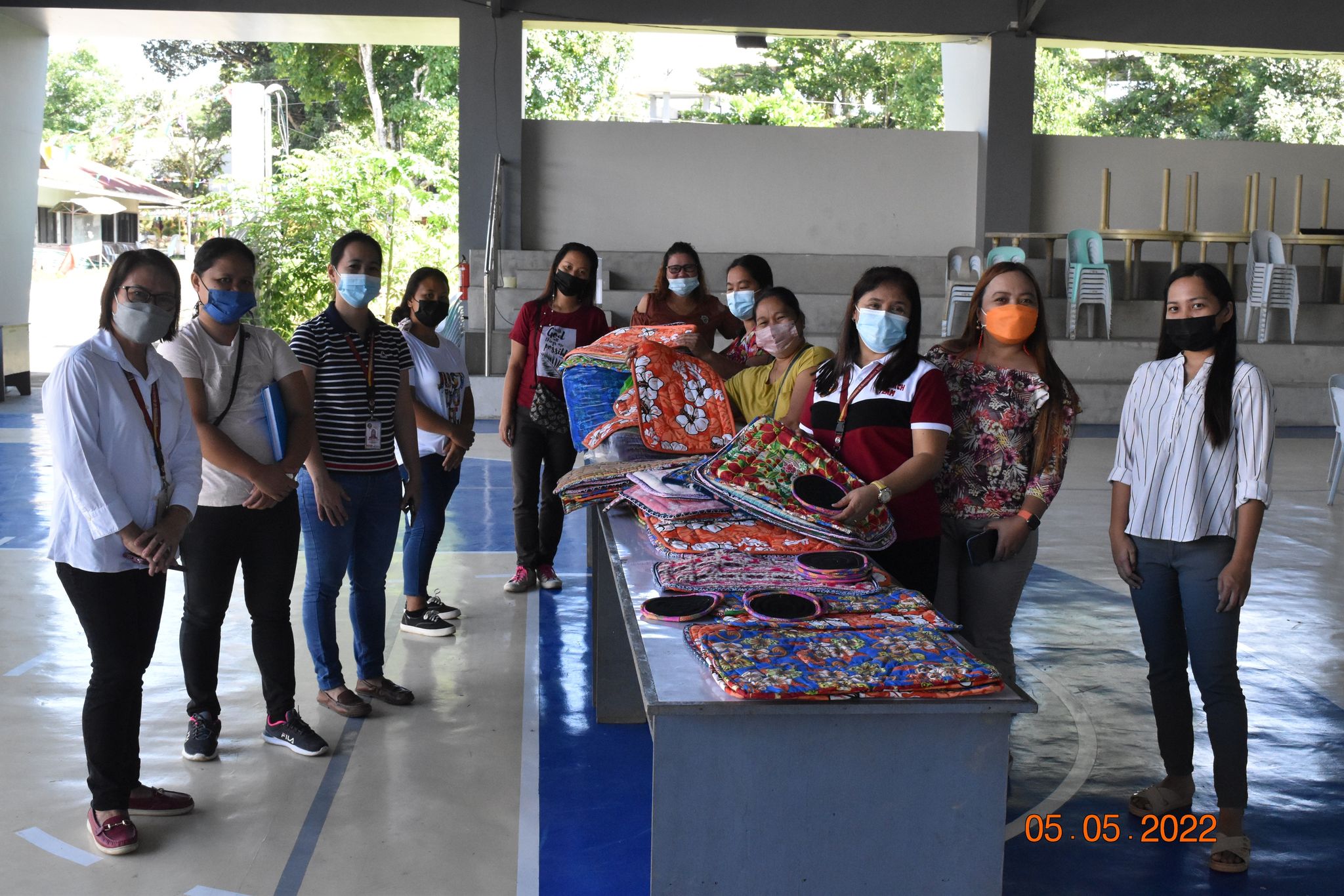
PROJECT BRAVEd (Braille Literacy Innovation for Educators)
The University of Southeastern Philippines (USeP) through the College of Education (CEd) implemented a PROJECT BRAVEd (Braille Literacy Innovation for Educators) which aims to serve Special Education (SPED) and regular teachers of the Department of Education (DepEd) Davao City Division by training and orienting them with the use of modified Braille technology called “Brailleance” for the visually impaired learners. The project ran for six (6) months headed by Dr. Angelie V. Cabajes of USeP-CEd.
The project was funded by the USeP Extension Division. DepEd provided technical support on the conduct of the project and identified key personnel of the Davao City Division who will serve as the recipients of the project while USeP created the team that conducted the project and provided 20 Brailleance for the conduct of the project.
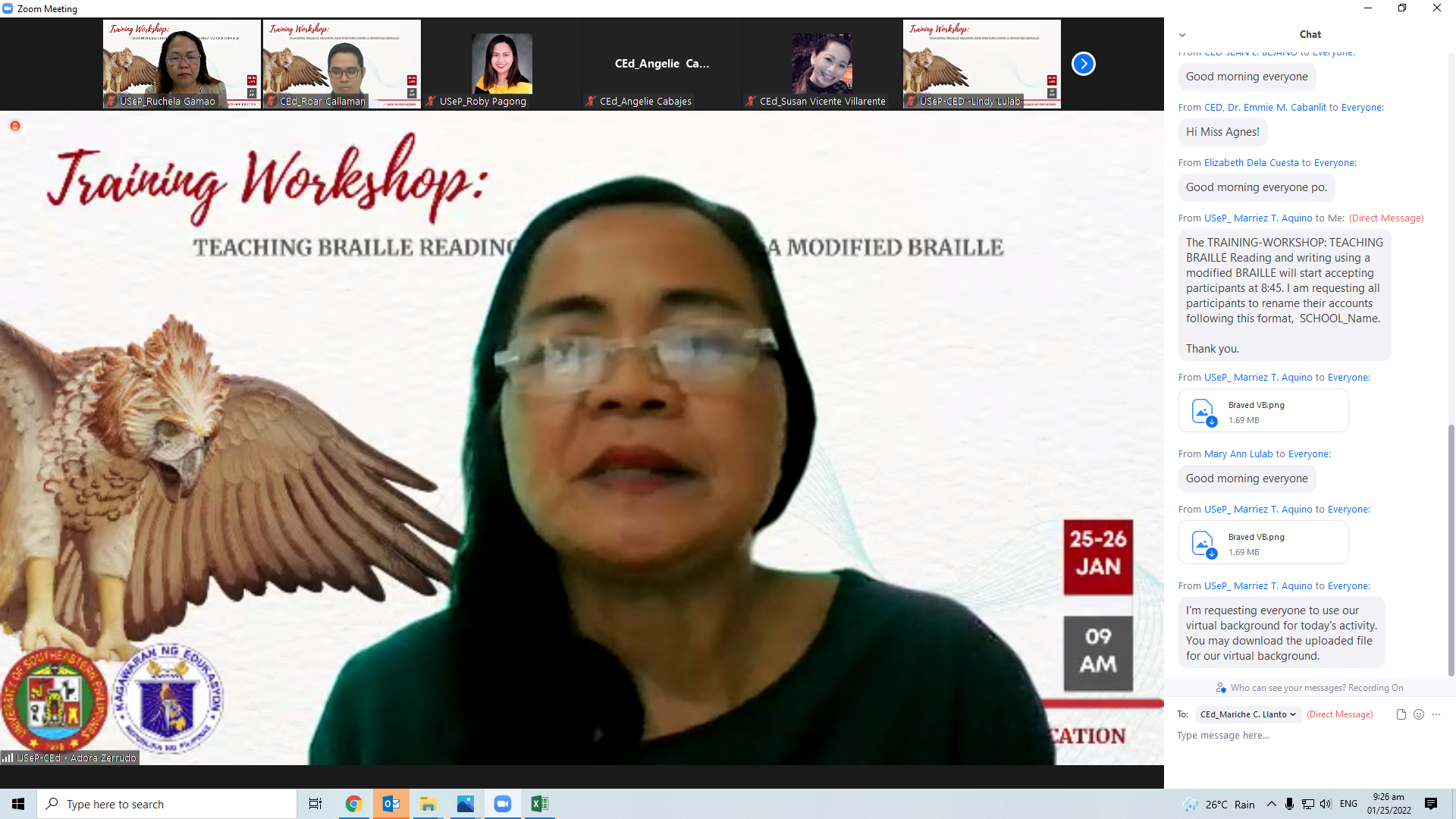
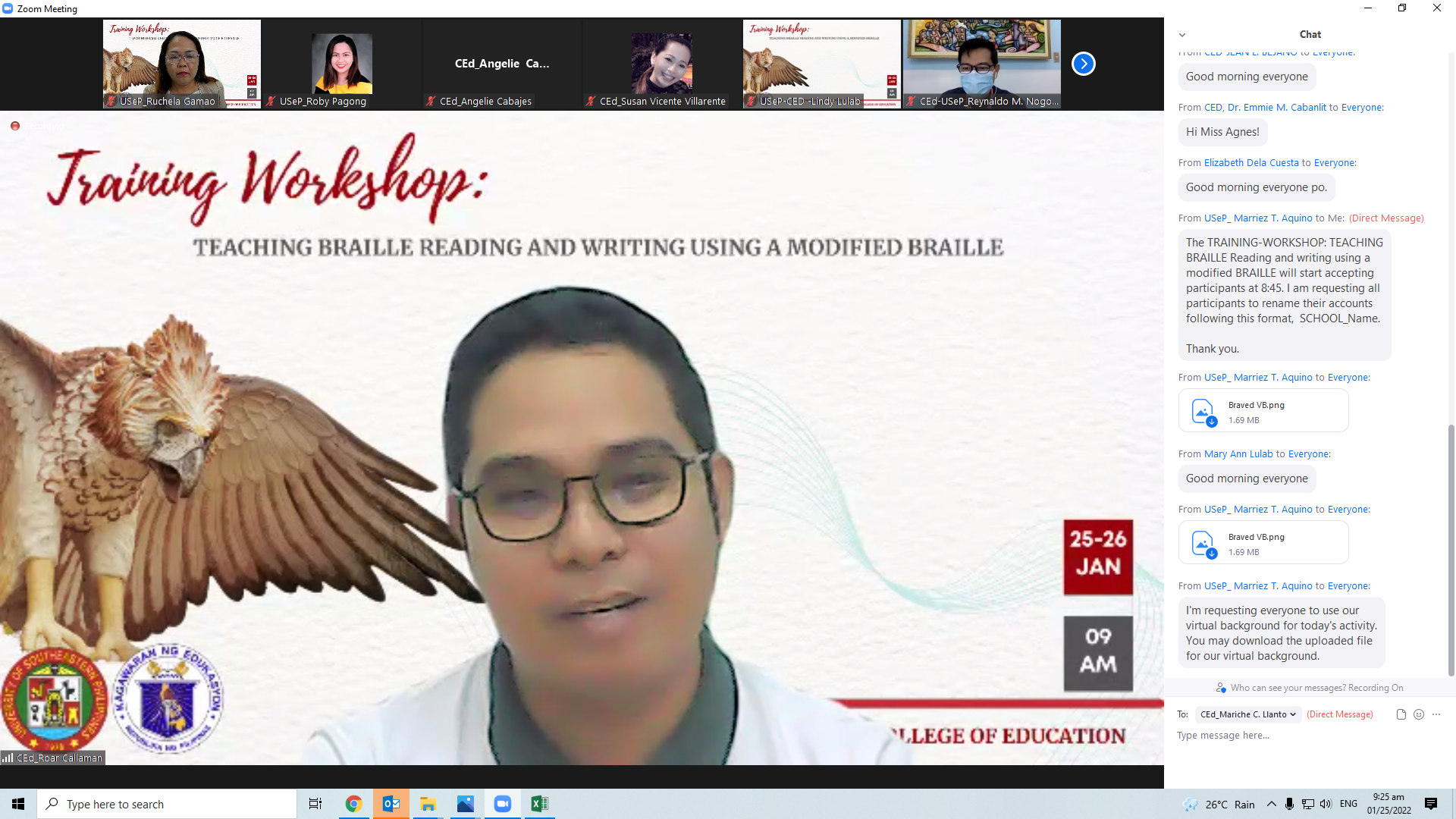
Operation RB: Resiliency Booster for USeP Constituents amid COVID-19 Pandemic
To promote physical and emotional safety among its constituents, the University has conducted several initiatives such as the launching of the COVID-19 Action Center to ensure that the basic needs are met by stranded undergraduate students, providing free transportation for skeletal workforce, and conducting Mental Health Survey and online music therapy sessions (“USeP COVID-19 Updates”, n.d.). Even though the partial easing of community quarantine is in place, the protection of health and safety for the students and University personnel are of utmost priority. Adopting the Department of Education Order 007, Series of 2020 can mean ample time to undertake the necessary preparations for the incoming school year on August 24, 2020 (Department of Education, 2020). However, there is no doubt that the mental health repercussions of COVID-19 pandemic can remain long after life returns to normal (Brooks et al., 2020).
Consistent with the call to build upon what is best in an individual, this extension program is a wellness-focused intervention that the University, through the College of Education, has implemented to improve the psychological capital of its constituents. This extension program Operation RB assumed that resilience is inherent among, as well as learned, by individuals. With this, associated factors with which resiliency can thrive was initiated; thereby ensuring individuals to learn and fully utilize their inherent resiliency, strengthen it, and increase their capacity to alleviate the effects of stressors brought about by the COVID-19 Pandemic. After all, human resources trained to have technical knowledge would be more productive individuals and effective members of society if their intrapersonal strength and ability to surpass life’s challenges were just as equally honed.

EyeSee-Enabled Barangay (EEB) II
Advances in information communication technology (ICT) can potentially offer a beneficial impact on barangay governance. ICT can be mobilized to enable barangays to enhance their delivery of public goods and services. It is perceived that a barangay with strong ICT capacity can make a difference in the field of governance including basic delivery of services. Through ICT, barangays can provide better services to their constituents with efficiency and effectiveness. With the aid of ICT solutions, barangays can improve transparency and accountability in their services and can pave the way for good governance initiatives.
The University of Southeastern Philippines – College of Information and Computing believes that the Academe has a social responsibility to extend help to the community, thus, the University lives up to this mandate by providing ICT services and solutions to help barangays improve the way they deliver their services to their constituents. USeP-IC has the manpower and the ICT competencies to help transform barangays as champions of excellence in terms of their delivery of public goods and services thus making it easier to bring government closer to the people with the help of ICT.
To start with this initiative, two (2) of the research outputs of the USeP-CIC faculty, which are the Barangay Health Care System and the Barangay Records Management System were implemented in one (1) particular barangay within Davao City for pilot testing and has undergone monitoring and evaluation. Other barangay ICT needs, as identified in the needs assessment phase of this program, were also addressed.
The extension program of USeP-CIC, coined as EyeSee-Enabled Barangay, capacitated barangays with the help of ICT to enable them to perform their tasks and responsibilities towards improving their basic services delivery to their constituents.
Specifically the program aims to (1) Improve the computer literacy of barangay constituents and (2) Enhance the delivery of public goods and services in the barangay through the implementation of efficient information systems.
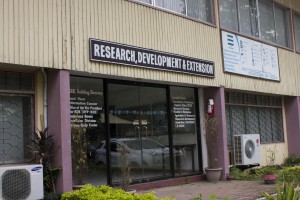
Iñigo St. Bo. Obrero, Davao City 8000
loc 217
